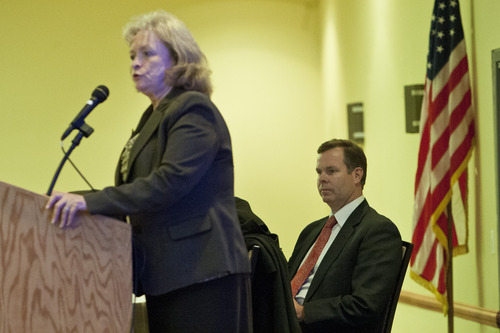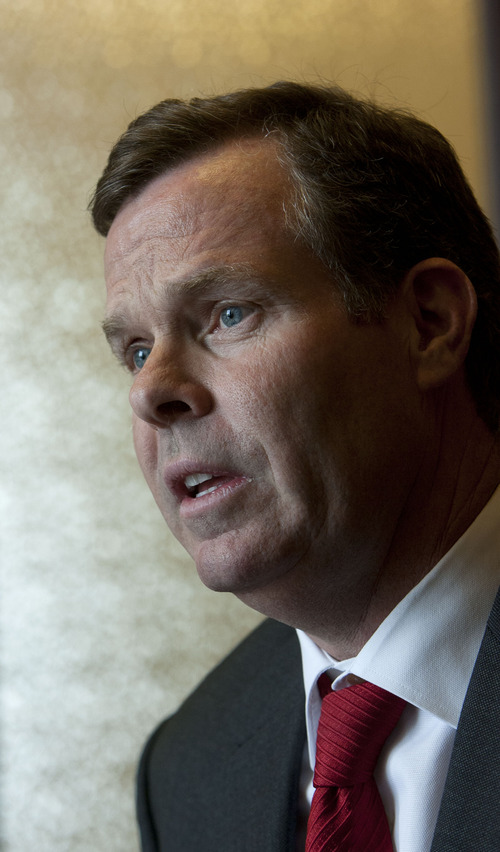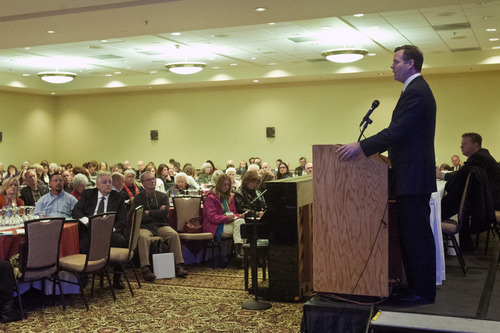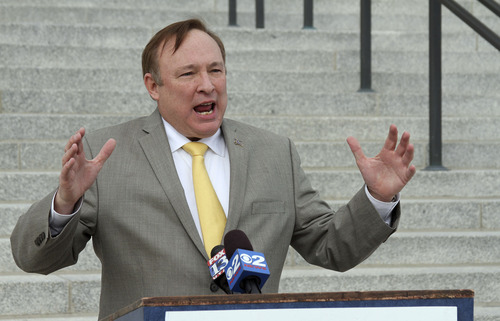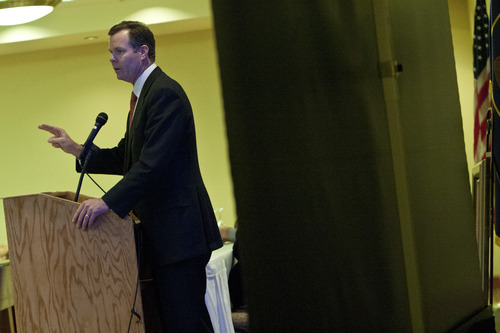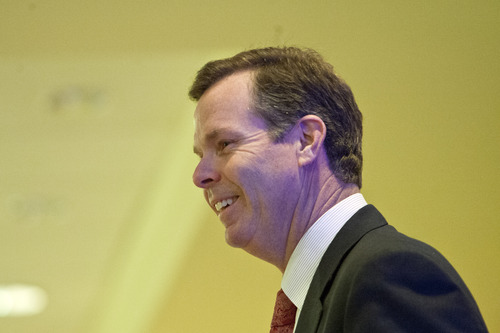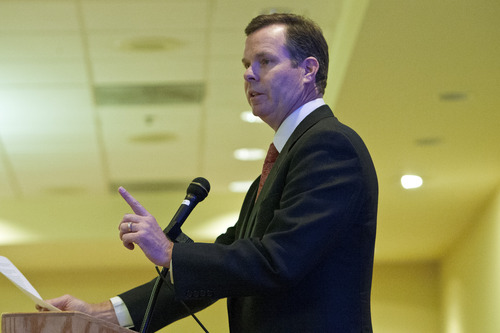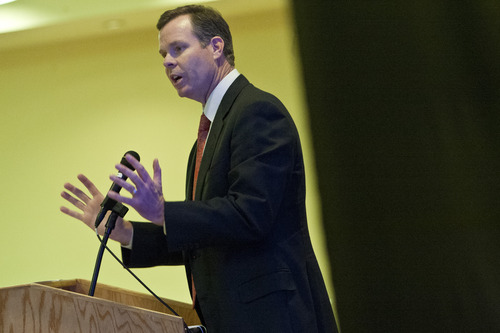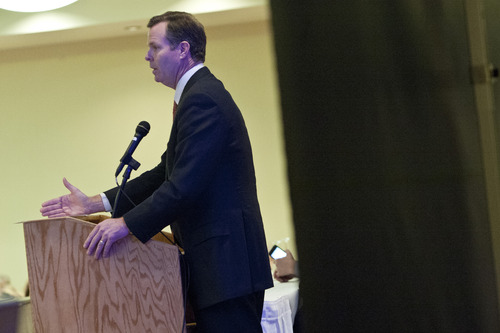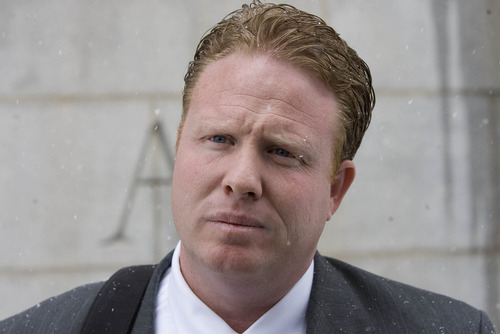This is an archived article that was published on sltrib.com in 2013, and information in the article may be outdated. It is provided only for personal research purposes and may not be reprinted.
As Utah Democrats called for a federal investigation, Utah Attorney General John Swallow late Saturday issued a strong denial of allegations that he helped broker a deal to help embattled businessman Jeremy Johnson's legal problems go away — an arrangement Johnson considered a bribe.
Swallow said in a statement that Johnson has done "everything he can to damage me as a desperate way to get out of his own legal problems."
"My intentions were good but I misjudged Mr. Johnson's character and regret meeting with him," Swallow said.
The statement includes a point-by-point denial of Johnson's claims that Swallow put him in touch with Richard Rawle, the late founder of the Check City payday loan businesses, to arrange a bribe. Johnson said he agreed to pay $600,000 to Rawle, who would use his connections with Senate Majority Leader Harry Reid to make Johnson's problems with the Federal Trade Commission disappear.
"Jeremy Johnson is desperate to do and say anything possible to attempt to secure a better deal with federal prosecutors. He has made false and defaming statements about me," Swallow said. "It is hard to accept anyone would give any credibility to Mr. Johnson's outrageous assertions."
Earlier Saturday, Utah Democrats called on U.S. Attorney General Eric Holder to appoint a special prosecutor with subpoena power to conduct a thorough, independent investigation of Johnson's allegations.
"The people of Utah need to have confidence that the whole story is going to be told," said Jim Dabakis, Utah Democratic Party chairman. "It's only fair for John Swallow and for everyone else involved that an [investigator who is] independent, nonpartisan and not part of the Utah system come in and ask the hard questions and have an absolute, follow-the-facts-wherever-they-go, kind of investigation."
Democrats launched a petition online to push for an investigator without political ties or entanglements in Utah's power structure.
"The people of Utah deserve to know if their elected officials are crooks or unethical," Dabakis said. He said he hoped Gov. Gary Herbert and Swallow would join him in calling for the investigation.
In his statement, Swallow said Johnson contacted him in 2010, presenting himself as a respectable businessman who was being treated unfairly by the FTC. Swallow, who at the time was one of Attorney General Mark Shurtleff's top deputies, put him in touch with Rawle, Swallow's former employer, who Swallow said had connections with federal lobbyists who might be able to help Johnson.
"I did tell Mr. Johnson the lobbyists would be expensive but was never involved in any negotiations over the costs," Swallow said.
Swallow produced an affidavit from Rawle signed three days before Rawle died from cancer, stating that Johnson paid Rawle $250,000. Rawle used $100,000 of that money to hire unnamed lobbyists to try to avert a lawsuit against Johnson and I Works, Johnson's Internet marketing company, the declaration said. Rawle's fee was $50,000.
"I have recently heard that Mr. Johnson is making allegations that money was used to inappropriately influence a member of Congress," Rawle said in the affadavit. "I have no knowledge of any such plan and expressly deny this allegation."
A separate affidavit from Scott Leavitt, an I Works executive, said he put up $200,000 of the money paid to Rawle for an advocacy campaign to prevent FTC action, but considered the money nonrefundable.
Despite payments made to RMR Consulting, a company Rawle set up, the FTC ultimately sued Johnson and I Works and Leavitt. Johnson also later was charged with a single count of mail fraud.
Johnson demanded to be repaid, leading to a meeting with Swallow at an Orem doughnut shop that Johnson secretly taped. During the meeting, Swallow acknowledged being paid by Rawle for consulting work he did.
Swallow said Saturday that the consulting work — done on a limestone project in Nevada — was unrelated to the deal between Rawle and Johnson, although the affidavit from Rawle said he used Johnson's money to pay Swallow for his services.
The payments from Rawle and Swallow's interest in the consulting business were not listed in Swallow's candidate financial disclosure.
In addition, there is no record of any lobbyists registered to lobby on behalf of RMR Consulting, Rawle, Johnson or I Works.
After failing to recoup his money, Johnson threatened in October to use the information against Swallow unless he dropped out of the attorney general's race. Swallow stayed in, won the race and was sworn into office Monday.
Johnson said $75,000 was put into an account for Leavitt on Dec. 3. Johnson said the money came from Swallow, but Swallow said it was paid by Rawle.
Johnson responded to Swallow's statement in his own statement relayed by a public relations firm hired by his law firm.
"I stand by my comments to The Salt Lake Tribune about the nature of the situation involving myself, John Swallow and Richard Rawle," he said. "That said, I understand I am a criminal defendant raising concerns about an elected public official — this is not a level playing field, yet I believe my understanding of the agreement to be accurate."
Johnson was scheduled to change his not-guilty plea to the fraud charge on Friday and agree to a 135-month prison sentence. He said his goal was to spare his family and friends the risk of prosecution.
But the deal broke down when federal prosecutors balked at including Swallow among a list of names of people he wanted spared prosecution as part of the official record. Prosecutors apparently had agreed informally to the list but didn't want it included as part of the plea deal.
Also on Saturday, Swallow's campaign consultant, Jason Powers, recounted a conversation he had with Johnson a few days before Swallow's June primary where Johnson threatened to give up Swallow to federal investigators.
"Jeremy told me that he could lie about John Swallow to the feds as part of a plea deal," Powers said, "but that he wouldn't do that because it would be a lie and John is a friend and the only politician that has never asked anything of him."
Powers said after the conversation he told Swallow that he felt like Johnson was blackmailing the candidate and that Swallow should consider hiring an attorney, which he did.
Johnson denied Powers' recollection of the conversation, saying it focused on his desire to recoup the money and nothing more.


